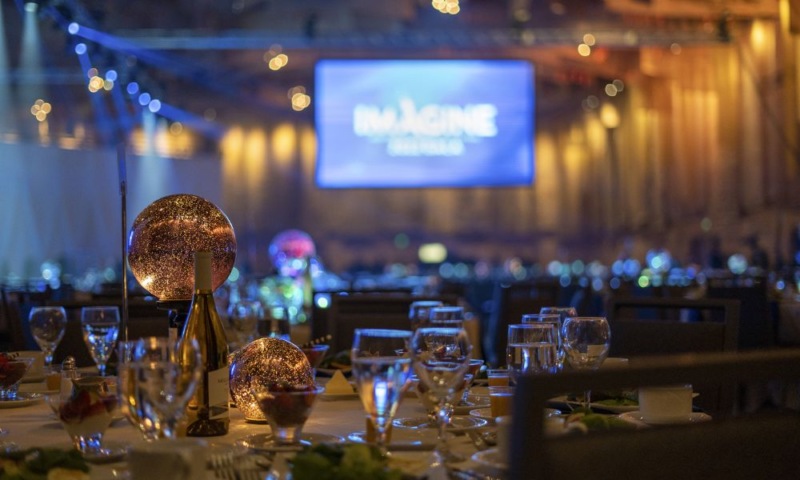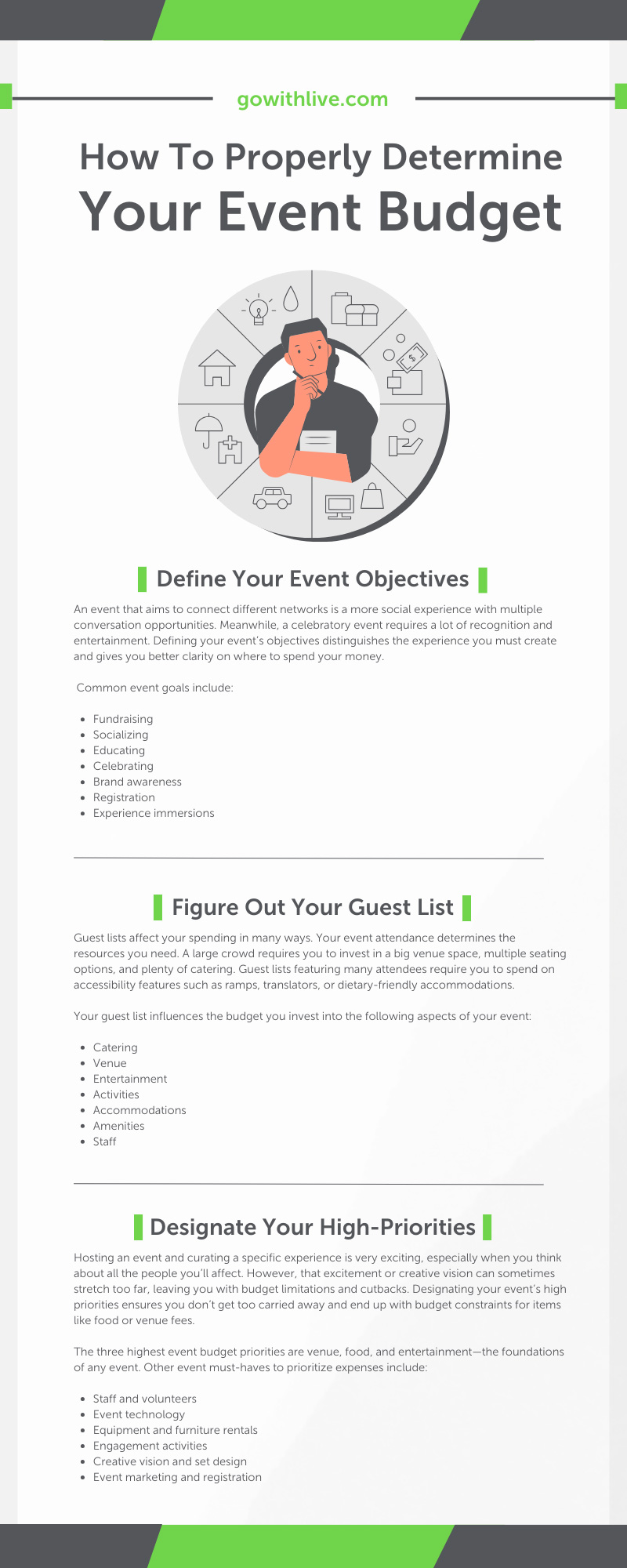
How To Properly Determine Your Event Budget
Hosting a memorable event experience involves considering all the little details, from food selection to venue lighting. Your event budget greatly affects the experience your message or brand can offer.
Proper money management allows your company to shape your major events to best meet your goals and desires with the resources available to you. Maximizing your budget guarantees a better return on investment and enhanced guest experiences. Learn how to properly determine your event budget and ensure you make the most of your available resources and capabilities.
Define Your Event Objectives
What do you want to achieve with your event? Your event objectives set the foundation of your experience. If you want to educate fellow industry experts on the latest technology for your field, you’ll need to create a learning experience with informative lectures, interactive experiences, and engaging demonstrations. An event that aims to connect different networks is a more social experience with multiple conversation opportunities. Meanwhile, a celebratory event requires a lot of recognition and entertainment. Defining your event’s objectives distinguishes the experience you must create and gives you better clarity on where to spend your money.
Common event goals include:
- Fundraising
- Socializing
- Educating
- Celebrating
- Brand awareness
- Registration
- Experience immersions
Each event goal comes with different needs, from space requirements to technology, but all factors influence where and how you spend your budget. A thematic, immersive experience that aims to make guests feel as if they are a part of the event requires investing in thematic décor. Décor may be less important for an educational lecture, so you can use your budget to enhance other aspects of this type of event.
Figure Out Your Guest List
Guest lists affect your spending in many ways. Your event attendance determines the resources you need. A large crowd requires you to invest in a big venue space, multiple seating options, and plenty of catering. Guest lists featuring many attendees require you to spend on accessibility features such as ramps, translators, or dietary-friendly accommodations. Older crowds will prefer different forms of entertainment than younger crowds. Different age groups need varying forms of activities and entertainment, further influencing where and how you spend your event budget. Figuring out your guest list clarifies your potential budget spending.
Your guest list influences the budget you invest into the following aspects of your event:
- Catering
- Venue
- Entertainment
- Activities
- Accommodations
- Amenities
- Staff
Designate Your High-Priorities
Hosting an event and curating a specific experience is very exciting, especially when you think about all the people you’ll affect. However, that excitement or creative vision can sometimes stretch too far, leaving you with budget limitations and cutbacks. Designating your event’s high priorities ensures you don’t get too carried away and end up with budget constraints for items like food or venue fees.
The three highest event budget priorities are venue, food, and entertainment—the foundations of any event. Other event must-haves to prioritize expenses include:
- Staff and volunteers
- Event technology
- Equipment and furniture rentals
- Engagement activities
- Creative vision and set design
- Event marketing and registration
Once you allocate funds for the priorities, you can start determining budgets for other event details, from décor selections to potential amenities such as transportation and gifts. Prioritizing certain aspects of your event allows you to maximize your budget and make sure you’ve got the essentials before spending your money elsewhere.
Evaluate the Market and Past Events
During and right after the pandemic, event venues were limited due to social distancing efforts. With these limitations, venue prices increased. Evaluating current markets gives you an accurate estimation of how much money you should set aside for certain event attributes, including venue rental costs. Any trending supplies, locations, or entertainment are more likely to use up a larger portion of your budget.
Taking a look at similar past events can also help you determine what kind of event amenities you should consider in your budget planning. Sometimes, you don’t really know what you’ll need for an event until the day of. During an event, you might even discover what items you didn’t really need to buy because they hardly came in handy. Referring back to those insights and notes allows you to better plan and determine the essential items to buy. Skipping unnecessary purchases saves you money for other aspects of your event planning.
Partner With Vendors Early
Research and identify your vendors early in the process. Lean on their expertise and communicate your cost targets. Vendors can help maximize value if they better understand your budget constraints.
Many vendors offer better deals than others. One flower company can charge you one hundred dollars for each floral display you buy. In contrast, another can charge you the same price for a whole set or a lower charge overall. Not all vendors follow a fixed universal price for their services and goods.
Locking in your vendors means guaranteed cost expectations. You know who you are working with and the price they offer. Not locking in your vendors has you guessing on potential spending. You might be spending one hundred or fifty dollars on florals, increasing your risks of miscalculated budget costs and cuts. If you know who you want to collaborate with for your event, lock them and their prices in.
Set Aside Contingency Funds
Life comes with many uncontrollable variables. Planning and hosting an event is no exception to possible mishaps and disruptions. Setting aside contingency funds helps ensure that you have plenty of resources to amend any challenges. Whether you come across missing items, unforeseen labor overages, or damages, some spare change can help you navigate issues.
An enriched event that’ll have guests talking about it for many years to come is an event that has considered all the little details. After all, the various details, from décor to entertainment choices, shape your guests’ experiences. How you choose to spend your event budget affects all aspects of the experiences you create.
Use these seven tips and partner with L!VE to properly determine your event budget. Our production agency offers a full suite of integrated event services, including meeting planning. L!VE’s team of experts will make sure you go into any event with budget clarity, helping you maximize resources while delivering audience impact. Reach out to L!VE for all your in-person or virtual corporate event needs, and we guarantee you’ll get the most out of your next experience.
